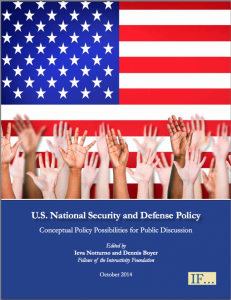A principal responsibility of our government is to provide for our national security and defense.  To do that our government continually uses its soft power, hard power, and intelligence assets to detect and fight various threats. Accelerating technological innovation, globalization, and our recent involvement in Afghanistan, the longest war in our history, have been teaching us about the changing nature of threats to our national security—from terrorism and irregular warfare to transnational crime—and are pushing us to rethink what the ‘readiness of a force’ means in the 21st century. This discussion guide invites us to consider the following questions and explore contrasting policy possibilities for the future. What are some different ways of defining or describing national security? What concerns might Americans have about national security? What policy possibilities might we develop for the future of national security? How can we uphold our values while ensuring security? This guide invites participants to consider these alongside other questions by which to develop a deeper understanding of the future of U.S. defense and national security.
To do that our government continually uses its soft power, hard power, and intelligence assets to detect and fight various threats. Accelerating technological innovation, globalization, and our recent involvement in Afghanistan, the longest war in our history, have been teaching us about the changing nature of threats to our national security—from terrorism and irregular warfare to transnational crime—and are pushing us to rethink what the ‘readiness of a force’ means in the 21st century. This discussion guide invites us to consider the following questions and explore contrasting policy possibilities for the future. What are some different ways of defining or describing national security? What concerns might Americans have about national security? What policy possibilities might we develop for the future of national security? How can we uphold our values while ensuring security? This guide invites participants to consider these alongside other questions by which to develop a deeper understanding of the future of U.S. defense and national security.


